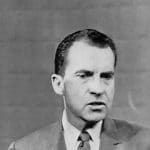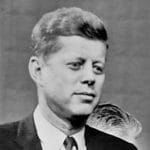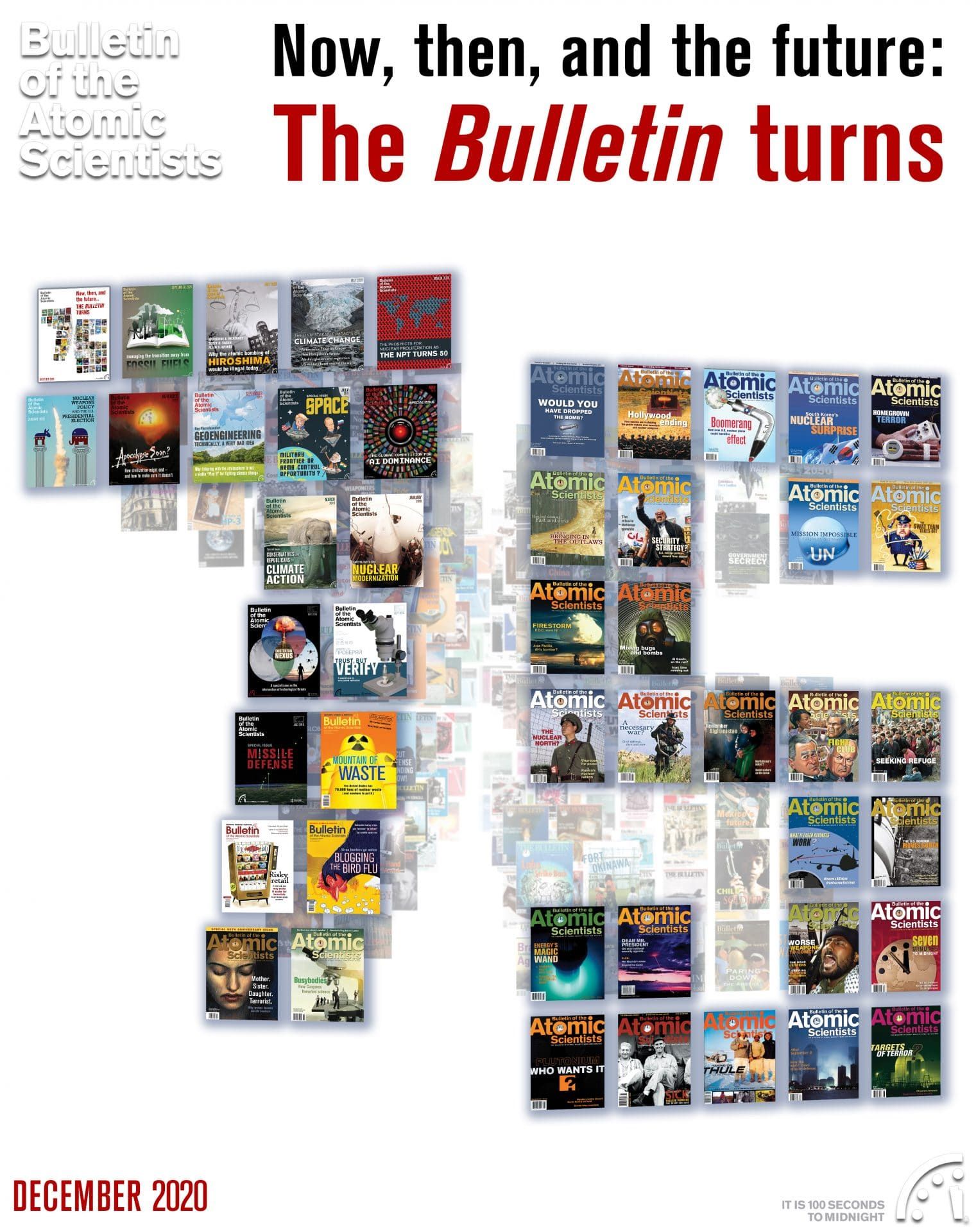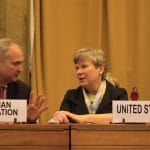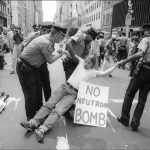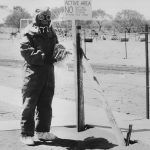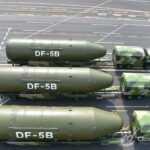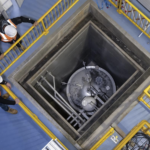1960: Science and party politics
By Richard M. Nixon, John F. Kennedy | December 7, 2020
1960: Science and party politics
By Richard M. Nixon, John F. Kennedy | December 7, 2020
Editor’s note: These companion articles by presidential candidates Richard Nixon and John F. Kennedy were originally published in the June 1960 issue of the Bulletin. They are republished here as part of our special issue commemorating the 75th year of the Bulletin.
On Disarmament
The unqualified dedication of the government and people of the United States to the cause of peace cannot be questioned seriously by anyone who knows our record in international affairs. But some of our friends, as well as our opponents, have questioned whether our policies are designed to further that objective.
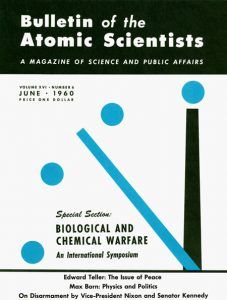 Why, for example, do we not accept the Soviet proposal for stopping all atomic tests?
Why, for example, do we not accept the Soviet proposal for stopping all atomic tests?
We can have honest disagreement over such issues as the extent of the danger from nuclear fallout if tests are not controlled, the possibility that secret underground tests may be able to evade any inspection system, and whether testing is necessary for full development of the peaceful uses of atomic energy.
But let us have no illusions on the major issue.
Stopping tests is not in itself going to reduce the danger of war. The types of weapons already in production are adequate to carry out their mission of massive destruction. That is why control of production as well as tests of nuclear weapons, as the United States has proposed, is the only formula which goes to the heart of the problem.
The same considerations are involved in the U.S. position on general disarmament.
There is no question as to our desire to enter into a disarmament agreement. The problem is securing an agreement that is enforceable—because an agreement without adequate inspection provisions, which one party might honor and the other might not, would seriously and perhaps fatally increase rather than reduce the risk of war.
I know there are those who suggest that we can make reductions in our defense establishment because of the prospects for disarmament. But the period in which negotiations for disarmament are taking place is the very time when we must not reduce our defenses.
Our primary objective in such negotiations must not be to reduce a burden of armaments we are unable or unwilling to maintain, but to reduce the danger of war which our armed strength is designed to prevent.
The road to war is paved with agreements based solely on mutual trust. That is why we best serve the cause of peace when we insist that any disarmament agreement must be accompanied by an inspection system which will enable all parties concerned to know whether the agreement is being carried out.
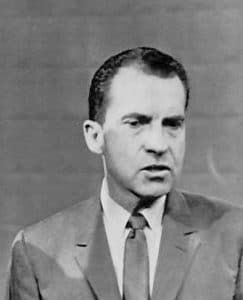
We must all agree that America and the free world must maintain military strength sufficient to meet and defeat any aggressor. We do this not because we want war but because we want peace, and because history teaches us that where a potential aggressor is on the loose, weakness invites attack and strength discourages it.
Nor must we ever assume that disarmament alone will remove all danger of war. A lasting peace cannot be built on the foundation of disarmament alone. We must continue to work unceasingly to remove those basic tensions which have made the world an armed camp in the first place.
Disarmament can be won
The most gaping hole in American foreign policy today is our lack of a concrete plan for disarmament.
No nation talks more of its dedication to peace. No subject occurs more frequently in the President’s addresses at home and abroad. No hope is more basic to our aspirations as a nation than our hope for the day when our bombs can be converted into reactors, our rockets can be devoted to exploring space, and the funds now in our defense budget can be used to build a better, happier, healthier nation and world.
Peace takes more than talk
However, as each year passes, the possibilities of disarmament—or, to use a more realistic term, arms control—become more difficult. It is harder to limit growing nuclear stockpiles than the shipment of raw materials-harder to inspect for missile sites than airbases—and harder to prevent surprise attacks once they can be launched from underground, underwater, or outer space. The engines of death are multiplying in number and destructiveness on every side, while the institutions of peace are not.
Pushbutton weapon systems based upon instant response—but capable of both mechanical and human error—could plunge the world into a nuclear holocaust through an act of inadvertence or irrationality. The galloping course of our weapons technology is rapidly taking the whole world to the brink. The same science that industrialized the West, then gave us our atomic monopoly, then transformed a Russian peasant society into a producer of sputniks, missiles, and H-bombs, is now awakening the sleeping giants of China, Africa, and all the world—moving by a logic of its own, out of the control of any one man or nation.
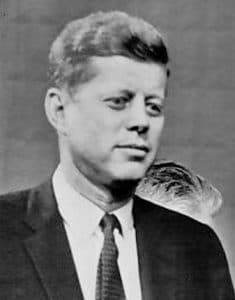
I am not simply talking about another war. A single nuclear weapon today can release more destructive energy than all the explosives used in all wars throughout history. The world’s nuclear stockpile today contains, it is estimated, the equivalent of 30 billion tons of TNT—about 10 tons of TNT for every human being on·the globe. No wonder it has been bitterly said that life may be extinct on other planets because their scientists were more advanced than ours.
No sane man should accept these facts with equanimity. No leader of any nation should rest content with this precarious equilibrium of terror. No nation should delude itself into thinking it has a strategy for the 1960s if that strategy is nothing more than the arms race, nothing more than the cold war, nothing more than the policies of the last two decades.
No issue, in short, is of more vital concern to this nation than disarmament; no issue could demand more priority of top-level attention than disarmament; and yet this nation has no consistent, convincing disarmament policy.
We have had Presidential speeches, Presidential advisers, and Presidential Commissions on Disarmament, but no policy. We have participated in previous conferences—on disarmament, on nuclear testing, and on surprise attack—but our conferees in every instance have been ill-prepared and inadequately instructed. We invited our Western allies to Washington in January to make joint preparations for the Geneva Conference, but we had no positive proposals of our own to offer them.
I am certain that the President is sincere when he says we want disarmament, but I am also afraid that the rest of the world is justified in wondering whether we really do.
The possibilities for disarmament
There are, of course, many powerful voices in the government—both in and out of the Pentagon—who do not want disarmament, or, professing to want it, do not really believe in it.
Disarmament to them is still merely a fuzzy ideal for fuzzy idealists. There can be no disarmament, they say, until world tensions have ceased, or until we know for certain that the Russians will live up to their agreement, or until a foolproof inspection system can be worked out, or until the Russians give up communism and its dreams of world domination. There can be no disarmament in short, according to these Pentagon and other policymakers, until—to use Mr. Khrushchev’s terms—”the shrimp whistles.”
But who, I ask you, are the true realists—those interested in serious efforts at arms control, or those who talk of war and weapons as though this were the good old days, in the pre-World War II, or nuclear monopoly, or premissile eras? The world of 1960, the utter folly of the present arms race, requires a new and different look at where we are headed.
I do not say that our dangers have receded or that our enemy has become benevolent. But I do believe that today’s international climate, more than ever before, holds out the possibility for an effective start on arms control.
For the Russians know, as well as we know, that the spread of nuclear weapons to France, later to Red China, possibly next to Sweden, and so on, may well upset the present balance of power, increase the very real dangers of accidental war, and contaminate the air on both sides of the Iron Curtain. They know, as well as we know, that a war of mutual destruction would benefit no nation or ideology; and that funds devoted to weapons of destruction are not available for improving the living standards of their own people, or for helping the economies of the underdeveloped nations of the world.
The Soviets will not, in the sixties, or as far as we can foresee, give up their ambitions for world communism. But the historian Toynbee reminds us that the cold and hot wars waged by a fanatic Islam and crusading Christendom gradually transformed themselves into centuries of perpetual truce, although both parties retained their universal goals.
Mr. Khrushchev will still want to “bury” us economically, politically, culturally, and in every other sphere of influence—but under what appears to be a more fluid and rational atmosphere since the death of Stalin, he may recognize that the path of Russian self-interest permits, and perhaps compels, him to agree to some steps toward comprehensive arms control.
Trust and inspection
The opportunities for such steps are many—agreements on nuclear tests, or on the prevention of surprise attacks, or on the exploration of outer space and its research, or on the peaceful uses of atomic energy, or on additional safeguards for tlie Antarctic, perhaps even on demilitarization in the Middle East, or an expansion of the U.N. emergency force.
But such a beginning can lead the way, once the Russians learn that international control and inspection are not necessarily to be feared, once Americans learn that accommodations are not necessarily appeasement, and once both sides learn that agreements can be made, and kept.
I do not say that we should rely simply on trust in any agreement. Certainly we need an inspection system which is as reliable and thorough as modem science and technology can devise. However, even with such a system, there will be risks. Peace programs involve risks as do arms programs, but the risks of arms are even more dangerous. Those who talk about the risks and dangers of any arms control proposal ought to weigh—on the scales of national security—the risks and dangers inherent in our present course. The only alternative to pursuit of an effective disarmament agreement is reckless pursuit of our present course: the arms race, the gap, the new weapons, the development of ever higher orders of mutual terror, all of which not only reflect tensions but obviously aggravate them.
I do not look upon arms control negotiations as a substitute for negotiating disputes. Certainly I would never permit an effort for disarmament to excuse any lag in our defense effort now. For it is an unfortunate fact that, while peace is our goal, we need greater military security to prevent war—an effective deterrent to encourage talks—and to bargain at those talks, as I have said, from a position of strength. In fact, as George Kennan has pointed out, we would facilitate the acceptability of nuclear arms control if we were to increase the strength of our conventional forces, as a means of weaning ourselves away from total dependence on nuclear weapons. But we must also remember that there is no greater defense against total nuclear destruction than total nuclear disarmament.
The inadequacy of existing agencies
A tremendous amount of policymaking, scientific research, data collecting, device development, and high-level guidance is necessary before we can back up our good words and intentions on disarmament with specific facts and plans.
The entire government staff currently engaged in arms control and disarmament research consists of fewer than 100 full-time men, scattered through four or five agencies, with little or no coordination, and almost no basic research. Indeed, what little research has been done has too often been negative: designing ways of evading proposed detection or inspection systems instead of perfecting them, demonstrating what won’t work instead of what will. The President’s special assistant for science and technology, Dr. George Kistiakowsky, has complained in a recent speech of the fact that our arms control conferees have consistently been forced to turn to ad hoc groups that found a dearth of experimental data.
Here is a gap equally as serious as the missile gap—the gap between America’s incredible inventiveness for destruction and our inadequate inventiveness for peace. We prepare for the battlefield, but not for the bargaining table. We pour our talent and funds into a feverish race for arms supremacy, bypassing almost entirely the quest for arms control.
The failure of past conferences
This gap has been apparent, to our enemy and to the world, at every arms control or related conference since the close of the Korean war. Our conferees have lacked both the technical backing and the high-level policy support and guidance necessary to make their mission a success. As a result, largely for propaganda purposes, they have sometimes offered proposals which they knew—or should have known—could not possibly be accepted; and they have been wholly unprepared to either seize the disarmament initiative or promptly respond when the Russians (who have more cleverly concealed their own divisions and uncertainty) did seize the initiative.
We are not prepared to respond to the Soviet disarmament proposals of 1955, or Mr. Khrushchev’s proposals at the U.N. last fall. Mr. Stassen’s efforts as a special disarmament negotiator were consistently undercut and opposed in the Pentagon, AEC, and State Department, and ignored in the White House.
Our delegates to the 1958 Conference on Surprise Attack were ill-staffed, ill-prepared, and ill-advised. They offered measures which were hastily put together, some of which, even if accepted, were of doubtful value; and others which in reality we were not prepared to accept—or even explain—ourselves.
When, at the Conference on Nuclear Testing, the Russians finally agreed to veto-free, on-site inspection on a quota basis—a major concession—we were not ready to state what a realistic quota would be. The technical data we pre sented on frequency response and grid spacing—the distance between monitoring stations—turned out to be wrong. Our own new data on underground testing baffied our negotiators. Even today, as that conference continues under our threat to resume testing, it is difficult to say what represents a single, clear-cut, well-defined realistic American inspection proposal.
Disarmament research
Plans for disarmament—specific, workable, acceptable plans—must be formulated with care, with precision, and, above all, with thorough research. For peace, like war, has become tremendously complicated and technological. I do not believe all the problems of peace can be solved by increased research—science and technology cannot fill our present gaps in vision, in leadership, and in sound, creative planning. But research can give us the vitally important knowledge which we must have if we are to lay the groundwork for effective control of today’s vast and complex weapons systems. Development of a workable plan to halt weap ons testing requires detailed studies in seismology, atmospherics, acoustics, and geophysics. The dread weapons of chemical and bacteriological warfare require still different inspection systems that will challenge the resources of Western science.
Peace, moreover, like war, raises tremendous economic and social problems. Economic research on manpower controls, budget controls, chemical processing plant quotas, and the availability of fissionable material is a necessary part of arms control research. Fear of disarmament can affect the stock market like the fear of war. Millions of jobs, billions of dollars of national income, are tied up in defense industries. No plan for disarmament can thus be complete without planning for the reconversion of our economy—for diverting our resources to the constructive channels of peace.
The arms control research institute.
It is to the elimination of these gaps in our knowledge and information—to the assurance that future American arms control conferees will be better prepared—that I am introducing for appropriate reference a bill to establish an Arms Control Research Institute. Based on a considerably modified version of the bill for a National Peace Agency, earlier introduced by Congressman Bennett in the House and developed by the Democratic Advisory Council’s Science and Technology Committee, this bill is designed to alleviate these glaring omissions in our preparation for peace and disarmament.
The U.S. Arms Control Research Institute, under the immediate direction of the President, could undertake, coordinate, and follow through on the research, development, and policy planning needed for a workable disarmament program.
I do not say that the Arms Control Research Institute will halt overnight the potentially disastrous arms race in which the world is now engaged. Perhaps, in view of our enemy’s strength and intransigence, nothing can. But we owe it to ourselves—to all mankind—to try to give peace more than our words and our hopes.
Together, we make the world safer.
The Bulletin elevates expert voices above the noise. But as an independent nonprofit organization, our operations depend on the support of readers like you. Help us continue to deliver quality journalism that holds leaders accountable. Your support of our work at any level is important. In return, we promise our coverage will be understandable, influential, vigilant, solution-oriented, and fair-minded. Together we can make a difference.
Keywords: archive75
Topics: Nuclear Risk, Nuclear Weapons
